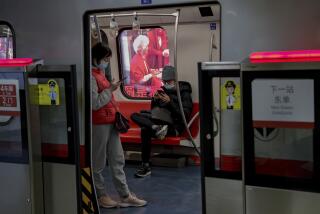A beloved Chinese comic gets the silent treatment
He’s foulmouthed. He’s subversive. He has no respect for authority. In a country where an insurgent spirit can land you behind bars, it made Guo Degang rich instead.
The stout, moon-faced performer is widely credited with reviving the popularity of cross talk, an ancient Chinese performance art that combines stand-up comedy with puns and poetry. A beloved hero of the working poor, Guo has twanged for years from taxicab speakers all over China.
But this summer, after poking snide fun at officialdom for much of his career, Guo has been abruptly silenced. The comedian has become the highest-profile casualty of a crackdown launched in recent weeks on what President Hu Jintao calls the “three vulgarities”: sex-obsessed, mindless and tasteless culture.
Stores purged their shelves of Guo’s CDs and books. Hackers assaulted his website so mercilessly that it was temporarily shut down. Two of the most prominent comedians associated with his troupe abruptly quit. The news media tried to dredge up dirt on Guo, accusing him of cheating in business, underpaying his fellow comedians and seducing married women.
Finely conditioned to detect whiffs of trouble, people are suddenly nervous to talk about him, let alone admit any fondness for his performances.
A few outspoken people have stuck up for Guo via Twitter and blogs. The comedian had grown too popular for the government’s taste, they contend. And unlike comedians who’ve twisted the once-subversive genre into a platform for exuberant praise of authority figures, he has been determined to continue the critical, sarcastic traditions of cross talk.
“He says things nobody else would dare to say, especially in the entertainment industry,” said Pu Zhiqiang, a lawyer who has criticized Guo’s treatment on Twitter. “The government was looking for an excuse to teach him a lesson, to say, ‘You should be flattering the government instead of criticizing.’”
::
Guo (pronounced Gwo) hasn’t been the only target. “If You Are the One,” a popular reality dating program, was forced to tone down and reinvent itself this summer after censors deemed it too sexy and materialistic. Online gaming and pornography have also come under renewed scrutiny.
The Communist Party has long viewed itself as a guardian of its own version of traditional, conservative Chinese values. But the declared battle against vulgarity also has a layer of political showmanship, stirring memories of the elaborately named campaigns extolled by Chairman Mao Tse-tung in a show of control, said Michael Anti, a prominent Chinese political blogger.
“It’s not an ideological campaign,” Anti said. “It’s about social order. It’s about obedience. It’s to remind people, ‘I’m your boss.’”
Guo is 37, but he looks older. Sometimes he stands onstage and gripes like a curmudgeon who’s plopped down next to you on a bus. In his own theaters and on the road, he talks about his life, his struggles, mundane things. But it comes with intricate wordplays, adroit use of slang, unexpected bursts of rhyme that resist translation into English.
The Chinese word for the art of cross talk is xiangsheng, literally “face and voice.” Sometimes Guo gets up alone and talks directly to the crowd. Other times, he brings along another comedian and jousts. Always the audience roars with laughter.
A sampling of his routines lingers in cellphone videos posted online by his fans. In one clip, Guo grouses to the audience about a routine that was, in his estimation, underappreciated by a nervous public.
“It was on the radio but it wasn’t appreciated. It got bad comments,” he told the crowd. “It reflected the evil side of ordinary Chinese people. It was not helping to build a harmonious society. It would ruin 50 years of achievements.”
Then he dropped the sarcasm.
“We’re hopeless,” he told the crowd. “There are many things we can’t talk about.”
That was the Guo whom working Chinese paid some of their hard-earned cash to see after long days at tedious jobs. He talked about sex and corruption and greed, and gave voice to the unharmonious malice that seeped quietly into their thoughts as they struggled to make ends meet. Guo skewered movie stars, politicians and professors, anybody who had prestige, really.
Guo’s stories could be morbid and crude: The son at a hospital bedside accidentally kills his father by standing on the oxygen line. The singer at a funeral drones on so long that even the corpse gets bored and snatches away the microphone. Gas is passed. Prostitutes turn up their nose at shabby clients. Businessmen put on the airs of professors with eyeglasses and shelves of unread books.
Only the poor man, the ordinary Chinese, escaped his monologues with dignity intact. And the crowd understood that he was one of them; he had come from the provinces without money or connections.
For years, he got more and more popular, and with the fame came money, and even a certain measure of cachet among the country’s powerful. He moved from teahouses to theaters. He opened a cavernous restaurant, Guo’s Dishes, in the posh Sanlitun district of Beijing. At his wife’s nearby boutique, designer frocks sell for well over $1,000.
Yet his success didn’t change his act.
“We can’t solve all your problems like cars, apartments, money,” he told the crowd one night. “We just want you all to be happy. During the next three hours, we’ll try our best to make you happy.”
::
The trouble started in early August, when a crew from state-owned Beijing Television showed up at Guo’s door to investigate claims that his garden had been illegally expanded into public land. A quarrel erupted, and one of Guo’s burly assistants attacked the reporters with their fists. Grainy video of the scuffle was repeatedly broadcast as China’s state media clamored for Guo to be punished.
The timing was bad for Guo: Just a week earlier, President Hu had said at a Politburo meeting that trashy popular culture was tarnishing society, and had to be wiped out. Guo’s routines, with their earthy sexual humor and taunting tone toward authorities, were ripe for attack.
“That’s right. He beat up the reporter, so be it,” a defiant Guo told a cheering theater crowd days later. But then he struck a mournful note.
“I feel sad for my country,” he said. “It’s very difficult to talk to Chinese people. You try to reason with them and they don’t get it. But if you slap them, they eventually get it.”
As business dried up and colleagues drifted away, Guo’s management team scrambled to improve the comedian’s image. He donated all proceeds from his last two shows, nearly $30,000, to the victims of flooding in western China. Then he paid $15,000 to adopt a pair of endangered tigers, a popular cause in today’s China.
But the public relations gestures did little to help. There is still a palpable, if undeclared, boycott on all things Guo. And the comedian himself remains out of sight. His manager tells reporters that the atmosphere is too difficult for Guo or his employees to grant any interviews.
His Beijing theater looks sunburned and deserted. The chestnut roasters, meat grillers and cigarette vendors who’ve eked out careers peddling cheap treats to the crowds grouse under their breath about the drop in business. But they are afraid to talk about Guo.
“It was so popular before you couldn’t even get a ticket,” says a woman roasting chestnuts over coals. “Now everyone is nervous to talk about him. People know what’s going on.”
Having said that much, she is afraid to give her name.
“Everyone has gone on leave for now,” snaps a theater employee who shoos visitors away from the theater door. “There’s nobody inside. No shows anymore.”
megan.stack@latimes.com
More to Read
Start your day right
Sign up for Essential California for news, features and recommendations from the L.A. Times and beyond in your inbox six days a week.
You may occasionally receive promotional content from the Los Angeles Times.






